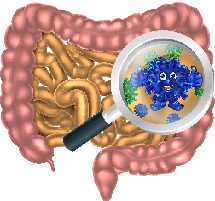I think when I use the two words, pro biotics, you know what I’m talking about. The amount of spotlight this particular topic of health receives must currently be one of the most heavily researched areas in medical science today, surely! And fair enough, the human gut or micro biome is so astoundingly important to our overall health and wellbeing, as we continue to find out more and more! Everyone ought to read up a little, and understand how important your gut health is, or should I just be upfront and say every parent has a responsibility to understand the importance of gut health and how to nurture that. Because quite frankly if your kid has a strong healthy gut you’re giving him or her a massive leg up in life.
Why is gut bacteria so important for our children?
So it’s pretty well established now that if your baby or toddler has a healthy gut – a really diverse array of gut bacteria with lots of different species of bacteria he or she is likely to happier, more outgoing, less likely to as sick as often, have a stronger immune system meaning less infections, less visits to the doctor and less medication! I’m proud to say my son has never had an infection (he’s nearly 3). They can potentially have higher cognitive scores and much less likely to develop chronic illnesses such as asthma later on in life. These just name a few of the benefits. But something as simple as not having to take your child to the doctor all the time for a script of antibiotics!
That last point segways us into, What affects their gut bacteria?
A recent study has just concluded that if your baby girl or boy has been on just 1 course of anitbiotics in their first 2-3 years of life they’re 60% more likely to have asthma as a teenager! And did you know that 90% of ear infections in children will resolve without the use of antibiotics? You can see where I’m going. Antibiotics can wipe out certain species of bacteria for good. However, some times they are needed, so if your little one has needed antibiotics read on to find out how to restore that tummy.
Bubs which are born via C-Section have less diversity then vaginal deliveries. And probably the biggest factor, formula fed babies vs breast fed really have a lower diversity. If you’re a breast feeding, well done! It really does have a profound impact on your baby’s early months of health. If you’re still breast feeding then your babies gut microbiome will resemble yours, once you start solids thats when her gut will change. So that’s why Mums it’s just as important you eat well too.
Here’s a fascinating fact about breast milk: In human breast milk you can find oligiosaccharides, which are carbohydrates made by Mum to specifically feed your babies gut bacteria. AND breast milk also contains stem cells so you baby can form and develop it’s vital organs quickly.
So when would using a probiotic be suitable? And how to choose the right one…
If you’re baby has needed a round of antibiotics, if you were on antibiotics during your pregnancy, if you had a C, or if you formula feed I think these are all reasons to supplement with a probiotic.
Here’s the goods, straight from a well regarded US based paediatrician, some simple instructions on how to choose your childs probiotic.
Step 1: Strain matter. Choose a probiotics with as many different strains as possible
Step 2: Babies can have probiotics too but they need a specific infant probiotic if they’re under 2. Babies guts, particularly C-section and formula fed babies, are comprised of mostly bifidobacter species. Toddlers above the age of 2 are pretty much the same as an adult, comprised of mostly lactobacillus. So choose age accordingly
Step 3: The amount of bacteria counts! When you read the label you’ll notice ‘CFU’s’ next to each labelled strain which indicates the dosage. Bubs under 2 should have 5-10 billion CFU/day! Toddlers over 2 and adults should be going for 10-25 billion per day!
Step 4: Which brands. According to Dr Elisa Song, MD her favourite infant probiotics are: Klare Ther-biotics for infants & Jarrow baby’s jarrow dopilus. For older kids: Metagenics ultra flora Childrens chewables and synergy powder, Metagenics ultra flora spectrum capsules.
Step 5 (last but not least!): Provide clean nutrient dense food for your children. Encourage them to eat fermented foods from a young age, like kimchi, kombucha, kefir, sauerkraut, miso, real pickles, pickled vegetables AND lots of fibre to feed the good bacteria, like garlic, onions, asparagus, sweet potato. A wide range of vegetables which are free from sprays and chemicals.
I may just add that I am not a doctor, nor do I have a degree in nutritional science or dietetics. I am a personal trainer who reads studies, listens to clever practitioners and passes on the research which can make a difference to your life. I specialise in pregnancy and postnatal health & fitness in Sydney, Australia. I would encourage you to critique all the information I’ve provided here to make sure it’s right for you.

